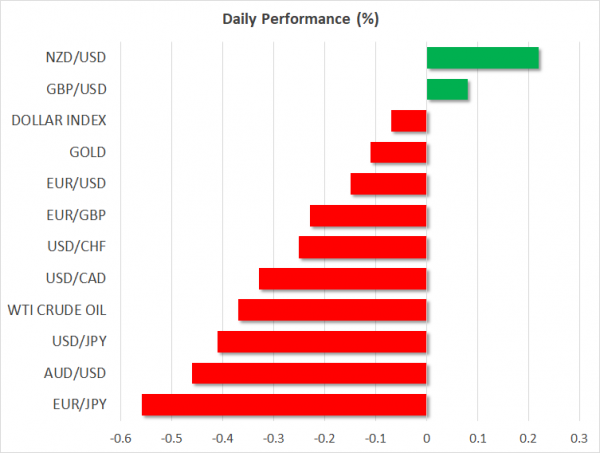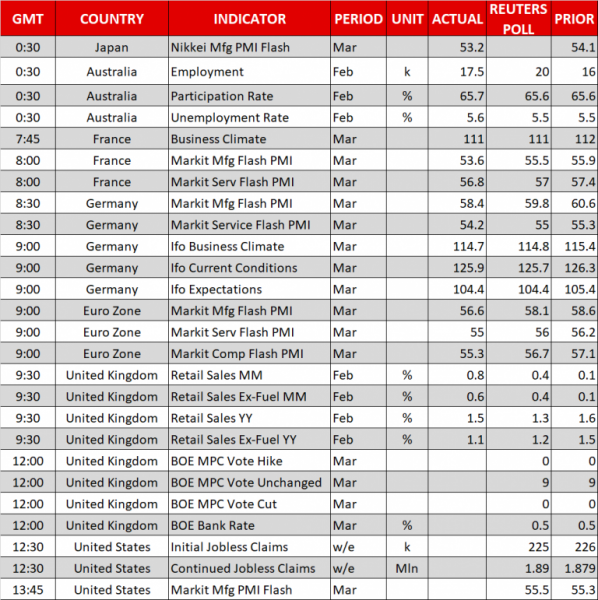Here are the latest developments in global markets:
FOREX: The US dollar index was falling by 0.03% against a basket of major currencies during early European afternoon and dollar/yen remained under pressure, losing 0.39%. The fall in the dollar came in after the Fed raised interest rates, as was widely anticipated, but stayed on course for three rate hikes this year, disappointing those who hoped for the famous dot plot to signal four rises for 2018. The euro managed to hit a one-week high of 1.2387 early on Thursday but the gains were short-lived, with euro/dollar moving lower towards 1.2317 (-0.15%) afterwards. Sterling will be in focus today as the Bank of England (BoE) is expected to announce its rate decision later today. Meanwhile, pound/dollar stretched up to 1.4180, the highest peak reached in seven weeks before it returned to 1.4148 (+0.07%). The Reserve Bank of New Zealand’s monetary policy announcement did not have a significant impact on the New Zealand dollar. Kiwi/dollar was last up by 0.26% on the day, while aussie/dollar was weaker by 0.44%. Dollar/loonie was unable to recover after a 200 pips fall on Wednesday, last seen at 1.2863 (+0.31%).
STOCK: European stocks posted strong declines on Thursday as trade concerns over a potential retaliation against Trump’s punitive import tariffs loomed in the background. The blue-chip Euro STOXX 50 plunged by 0.98% at 1100 GMT, the British FTSE 100 was down by 0.54%, while the German DAX 30 and the Spanish IBEX 35 were weaker by 0.86% and 0.91% respectively. US stock futures were in the red, poised to open lower.
COMMODITIES: WTI crude and Brent managed to recoup part of yesterday’s losses, but remained down on the day. The former climbed to $65.16 (- 0.05%), while the latter edged up to $69.40 a barrel. (-0.12%) Gold slipped to $1,329.40 per ounce (-0.18%), hovering near two-week highs hit late on Wednesday on the back of a weaker dollar.
Day ahead: Bank of England to leave rates unchanged; Trump set to announce tariffs on China
Following its US and New Zealand counterparts, the Bank of England (BoE) is next in line to decide on interest rates. However, unlike its US peer, the BoE is not expected to deliver any rate hike today at 1200 GMT, but according to market chatter, it may signal that a rise in borrowing costs from their current level of 0.5% could emerge in May. Yesterday, employment data out of the UK showed that the unemployment rate eased unexpectedly to 4.3% in January, while an improvement in wage growth was a bigger surprise after the numbers showed that average earnings jumped to a 2 ½-year high of 2.8%, fueling hopes that monetary policy could tighten in May when policymakers revise their economic projections. Therefore, if the BoE sounds more optimistic today, probably expressing satisfaction about the UK’s employment trends and the recent encouraging Brexit developments, the pound could extend gains as investors would be more confident that the BoE would raise rates in May. On the other hand, a cautious stance could send the pound lower. Investors will also keep a close eye on the vote count. Forecasts are for a unanimous 9-0 vote to stay on hold. However, if the most hawkish members, McCafferty and Michael Saunders, call for a tightening, turning the no-change vote to 7-2, the pound could post a stronger rally.
On the Brexit front, the EU summit takes place today in Brussels and any updates could be also important for the pound. While a two-year transitional period is a done deal following Monday’s agreement on transitional arrangements, any details on the terms that are not publicly known could pressure the currency.
In the US, according to a White House official, the US President, Donald Trump, will announce new import tariffs on China, amounting to $50 billion as rumors support, in an effort to punish the country for intellectual property theft, probably around 1630 GMT. Yesterday, the U.S. Trade Representative Robert Lighthizer said that the country would target China’s high-technology sector and impose restrictions on Chinese investments in the United States. In this event, a global trade war is what frightens investors as China is not expected to stay behind but respond accordingly, activating its own restrictive measures. Consequently, the aussie and the kiwi which are sensitive to China’s economic developments could lose ground in the wake of the news, while the risk-off sentiment could harm stocks and provide support to safe havens such as the yen and the Swiss franc.
Looking at today’s remaining data releases, initial jobless claims and Markit manufacturing PMI’s will be noted in the US at 1230 GMT and 1300 GMT respectively. During early Asian session, at 2330 GMT, Japanese inflation readings for the month of February will come into view as well. Regarding the latter, projections are for the headline and the core CPI to inch up by 0.1 percentage points to 1.0% and 1.5% on a yearly basis respectively.
In equities, the footwear maker Nike is expected to announce a decline in third-quarter profits on Thursday due to changes in the US tax code.
Finally, in terms of speakers, we will hear from Norges Bank Governor Oystein Olsen at 1615 GMT, as well as BoE Deputy Governor Dave Ramsden, at 1700 GMT. Bank of Canada Deputy Governor Carolyn Wilkins is also due to deliver remarks, at 1845 GMT.


